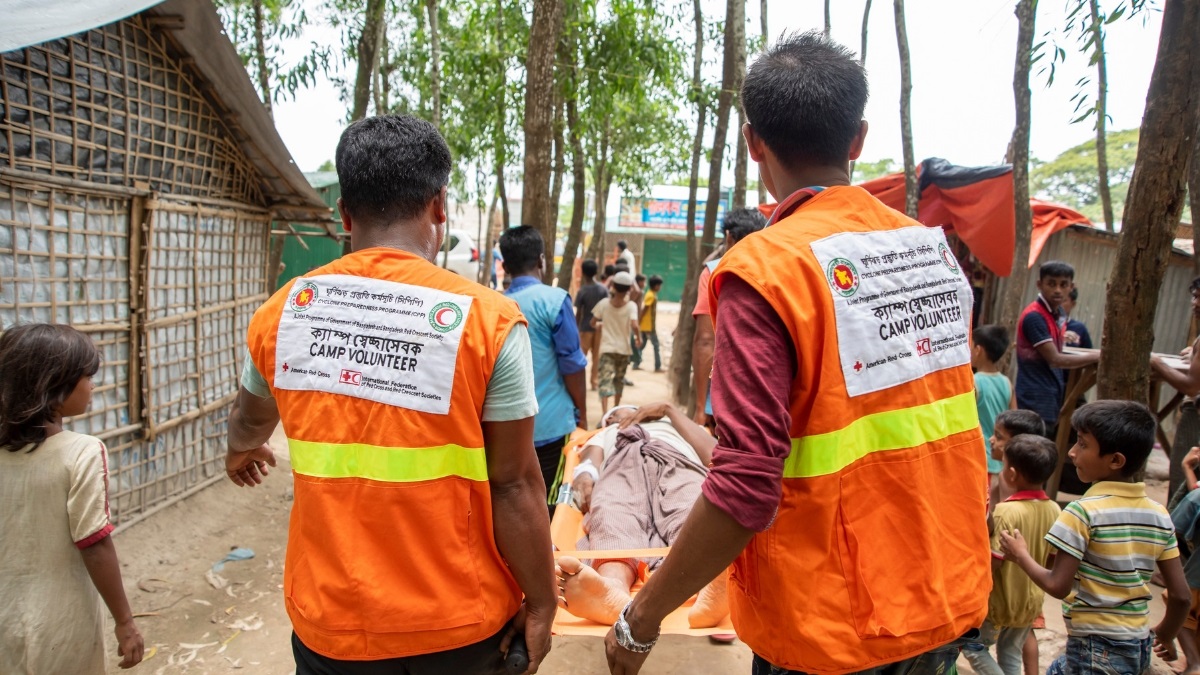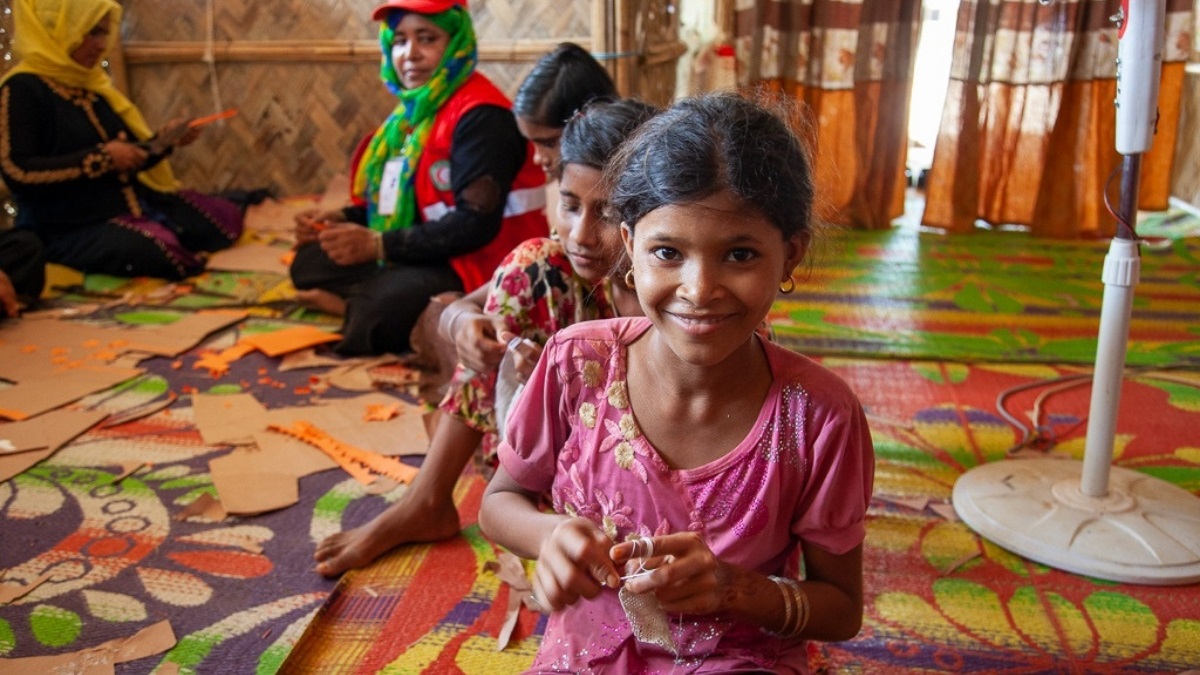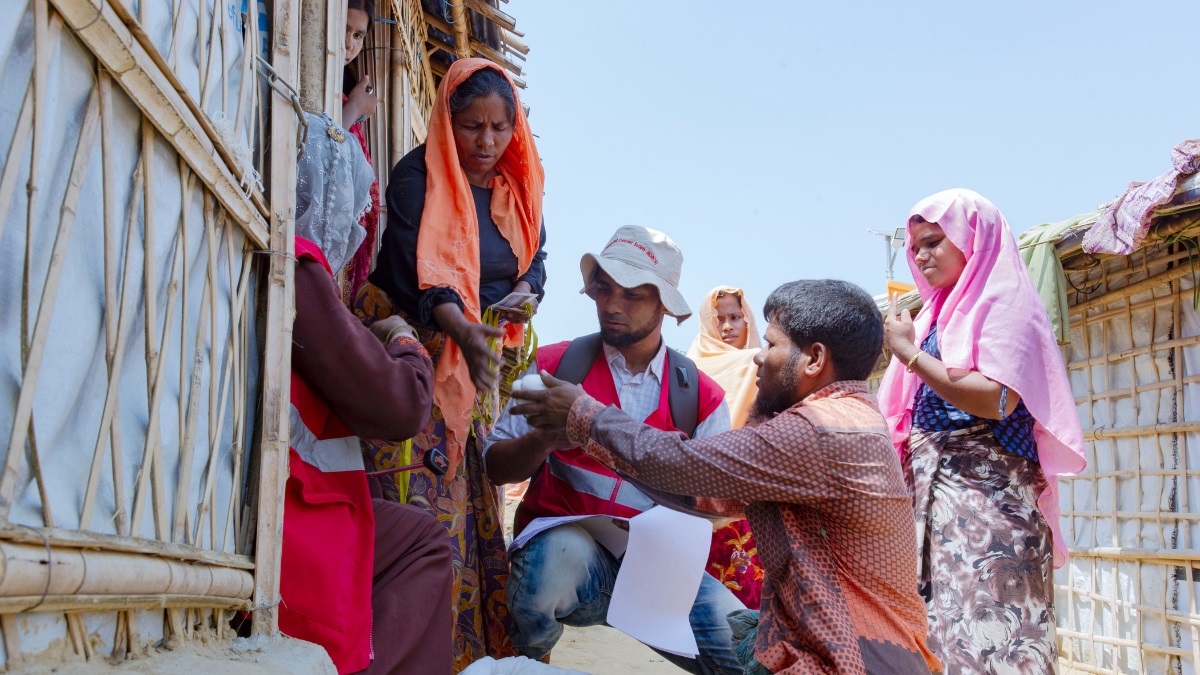Walking the tightrope to avoid a forgotten crisis in Cox’s Bazar
Anniversaries matter. Birthdays, weddings, anniversaries of the death of loved ones have a deep resonance for most of us.
As do anniversaries of historical and catastrophic events. They can be markers of before and after, of loss and recovery, of survival and new beginnings.
August 2019 marks two years since people from Rakhine fled violence in Myanmar for the safety of Bangladesh. Two years since 727,000 people carried babies, sick and disabled family members along with any possessions they could manage, and sought sanctuary under plastic sheets and bamboo in a narrow strip of land south of Cox’s Bazar next to Myanmar.

In a matter of days the area had a population density of over 60,000 people per square kilometre – one and a half times that of Manila, the most densely populated city on earth. And in one of the most disaster prone and poorest parts of Bangladesh.
By the time I took up a role with the Red Cross in Cox’s Bazar in early 2018, a city was in the making: camps etched into the hillsides of what was dense jungle, with the dubious honour of now being the world’s largest refugee settlement.
"The physical wounds stayed with the refugees long after the exhaustion of that great exodus. The psychological trauma continues, driven by painful memories and flashbacks, living conditions and uncertainty about the future."

This anniversary will reverberate throughout the camps and undoubtedly invoke painful memories for everyone who fled burning villages and terrible violence. It will bring to the fore an uncertain future; their enduring wish to return to their villages still reliant on conditions in Myanmar improving so they can be assured of a safe, dignified and voluntary return.
It will be spent in living conditions which have vastly improved since August 2017 but which still fall a long, long way short of what any fellow human being should have to endure.
Conditions described by International Committee of the Red Cross President as ‘shocking…that violate human dignity’. And this despite the very best efforts of the refugees, humanitarian organisations, including the Red Cross Red Crescent as well as the generous government and people of Bangladesh.
"I witnessed these efforts first hand. From dawn till dusk, week after week and often in pouring rain, hundreds of refugees did everything humanly possible to insulate the camp from the worst floods, cyclones and monsoon storms."
Humanitarian organisations worked with them every step of the way with building materials, guidance and good humour.
Reverberations are also echoing through humanitarian organisations – local and international, along with global donors - all acknowledging that this emergency has become a protracted crisis.
With no end in sight and with donor fatigue setting in, the driving imperative now is to design innovative and workable solutions that meet the twin needs of life saving humanitarian assistance and politically palatable longer-term responses that build resilience and social cohesion – within the camps and with their host Bangladeshi communities. And in a fiscally challenging environment, where humanitarian funds are increasingly limited. This is a complex and precarious ambition.

Bangladesh Red Crescent Society in Cox's Bazar, like many other humanitarian organisations, is working hard to meet this challenge - walking the tightrope of longer term planning while still meeting basic needs.
Its focus on improving basic conditions at the camps, particularly for larger households includes building new shelters, providing food and relief items, water, sanitation and hygiene promotion, along with other services including health care and psychosocial support. Its health facilities and community safe spaces are integral to the camps, and supported by hundreds of volunteers from both Bangladesh and Myanmar.
"Urgent priorities remain: more durable shelters that can withstand floods and cyclones; less congestion to afford more safety and privacy, particularly for women and girls; more evidence based protection to address trafficking, sexual and gender based violence, forced marriage and exploitation; plus access to fresh fruit and vegetables to stem a nutrition deficit."
Longer-term responses must include education and life skills training for the estimated half a million children who live in the camps. Livelihood opportunities for the men and women who desperately want to provide for their families.
More cash assistance programs to enable autonomy and contribution to the local economy. Investment in open spaces and shade for essential recreation and community-based cohesion activities to address the psychosocial needs of refugees.
Extending many of these responses to include the local Bangladeshi people will not only improve their living standards, but will go a long way to fostering social cohesion.
The challenge is immense requiring collective effort, responsibility sharing and ongoing commitment. Multiyear funding packages from donors is crucial to meet this challenge.
As is greater flexibility in what is permitted in the camps: more durable shelter materials; less restrictions on livelihoods responses; more formal education and learning opportunities, particularly for adolescent girls; and a stronger focus on security within the camps.

"A commitment is needed from international humanitarian organisations to build and nurture enabling actions that allow local actors to build their capacity and take more leadership roles."
And a recognition from all humanitarian organisations – local and international - of the need to work in a transparent and equal way and to privilege collaboration, respect and building on one another’s strengths.
Anniversaries allow us to trace a journey. To measure progress. There is no doubt that the commitment of donors and humanitarian organisations over the past two years has afforded refugees some semblance of dignity in one of the region’s worst ever humanitarian crises.
This commitment was more than matched by the hard work of the refugees, sandbagging steep slopes to prevent catastrophic landslides, constructing walkways and bamboo bridges over rivulets that become mudslides in wet weather, carrying human waste to faecal sludge treatment centres, building and repairing shelters and mosques, and keeping their families and communities together.
The great challenge ahead is to ensure that this protracted crisis does not become a forgotten one.
The great risk is not putting in place measures that give the refugees a sense of security and hope, and a voice to determine their future. We all have a responsibility and a part to play in meeting this challenge.
Opinion article by Louise McCosker, the international diplomacy lead at Australian Red Cross. Louise worked in Cox’s Bazar, Bangladesh in 2018 with the International Federation of Red Cross and Red Crescent Societies.
Charity donations of $2 or more to Australian Red Cross may be tax deductible in Australia. Site protected by Google Invisible reCAPTCHA. © Australian Red Cross 2024. ABN 50 169 561 394